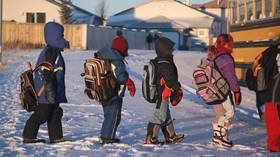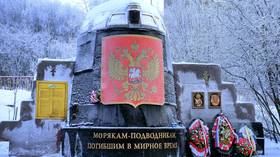Russian region cancels school as temperatures plunge below minus 50

Pupils in ten villages in the remote Russian region of Yakutia have been told to stay at home and study via distance learning with temperatures outside reaching a frigid -50°C (-58°F), the local administration has announced.
The villages are located in the Ust-Aldan district, near Yakutia’s largest city, Yakutsk. The region, also called the Sakha Republic, is world-famous for its incredibly low temperatures. It is home to Oymyakon, known as the coldest permanently inhabited settlement on Earth.
On Monday, the local government told 695 students to stay at home after a temperature of -50°C was recorded in the village of Kylaiy, in the Ust-Aldan district.
Some pupils are not so lucky, however. The exemption has only been granted to the very youngest children, and some older students are still being forced to attend lessons “depending on the temperature.” The mercury fell to -38°C on Monday in Yakutsk, where classes are going on as usual.
In recent years, Yakutia has hit the headlines for another type of extreme weather – forest fires. Earlier this year, the region was battered with fires spanning millions of hectares, causing the administration to declare a state of emergency.
Yakutia is particularly vulnerable to climate change because much of its infrastructure is built on permafrost. As it begins to thaw, it is predicted to lead to serious social and economic consequences.
Like this story? Share it with a friend!














